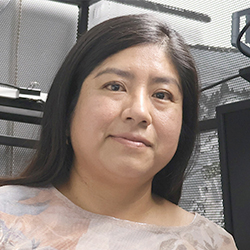|
Maria Cristina Perez Flores, PhD |
 |
Brief Bio
Maria Cristina Perez Flores, PhD began her journey through the Physiology of the Vestibular system as an ungraduated student at the Autonomous University of Puebla (BUAP, Mexico), where her group provided evidence that vestibular-afferent neurons in rats maintained in primary culture possess different calcium-activated potassium channels. Their expression and heterogeneity explain differences in these neurons' electrical-firing properties, which would unveil their role in coding the vestibular information.
Perez Flores was then accepted into the Biomedical PhD program at the University of Mexico (UNAM), during which she studied the intrinsic properties of the vestibular-afferent neurons and determined how the activation of the efferent system modifies the basal discharge and the dynamic response of vestibular-afferent neurons to head gravitational motion stimuli. She demonstrated that muscarinic-receptor activation inhibits the potassium current called IKM. In many vestibular-afferent neurons, they showed increased excitability, and the mechanism underlies the inhibition of IKM. The clinical ramifications of the findings were significant, contributing to the understanding of the actions of anticholinergic drugs (inhibitors that will decrease vestibular afferent activity). In particular, the use of scopolamine for motion sickness and other vestibular system-related symptoms.
In 2011, Perez Flores was enthusiastic about investigating and working in the Auditory System Physiology. She had the incredible opportunity to join Dr. Yamoah’s Lab as a Postdoctoral fellow at the University of California in Davis and later, continuing at the University of Nevada Reno. She has been researching auditory and vestibular neuroscience, regulation and mechanisms of age-related hearing loss, and ion channel-mediated plasticity in auditory neurons during this time. She has a strong background in Biophysics, Physiology, Molecular Biology, and Medicine, which allows her to design, develop, and analyze data from experimental paradigms using electrophysiological, molecular, genetic, and imaging techniques. Her passions lie in teaching and research, and she has mentored undergraduate and graduate students and postdoctoral fellows over the years.